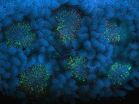(Press-News.org) Diagnosis of deadly brain conditions could be helped by new research that shows how infectious proteins that cause the disease spread.
The study reveals how the proteins - called prions - spread from the gut to the brain after a person or animal has eaten contaminated meat.
Scientists say their findings could aid the earlier diagnosis of prion diseases - which include variant Creutzfeldt-Jakob disease (vCJD) in people and bovine spongiform encephalopathy (BSE) in cows.
In people, the disease remains very rare - 229 people have died from vCJD since it was first identified almost 20 years ago, of which 177 were from the UK.
Prions are infectious proteins with abnormal shapes that can be passed between people and animals by eating contaminated meat. Until now, it was not known how prions spread from the gut to the brain after consuming infected meat.
Researchers at University of Edinburgh's Roslin Institute studied the course of prion infection in mice.
They found that prions must first build up in specialised structures in the lining of the small intestine before they are able to spread throughout the body to the brain.
The structures - called Peyer's patches - are part of the body's immune system and form the first line of defence against contaminated food. The study suggests prions hijack Peyer's patches to cause infection.
Prions did not build up in similar patches in the large intestine until a later stage of infection, the team found. At this stage, prions were also detected in the spleen and lymph nodes.
As many as one in 2000 people in the UK could be carrying infectious prions without showing any symptoms of disease, according to recent estimates. These are based on analysis of tissue taken during routine appendix removal operations.
The researchers say that these estimates may fail to identify individuals in the earliest stages of infection, where prions have not yet spread beyond the small intestine.
When prions get into the brain, they destroy nerve cells. This can lead to major neurological symptoms including memory impairment, personality changes, and difficulties with movement.
Other prion diseases include scrapie in sheep and chronic wasting disease in deer.
Professor Neil Mabbott, of The Roslin Institute at the University of Edinburgh, who led the study, said: "Whether all individuals with evidence of prion infection in their gut go on to develop neurological disease is not known. We need a greater understanding of what factors enhance our susceptibility to prion diseases so that we can put in place safeguards to prevent these conditions from spreading in people and farmed animals."
INFORMATION:
The study, published in Journal of Virology, was funded by the Biotechnology and Biological Sciences Research Council.
The Society of Thoracic Surgeons, the Society of Cardiovascular Anesthesiologists, and the American Society of ExtraCorporeal Technology have released a set of clinical practice guidelines to address management of a patient's temperature during open heart surgery. The guidelines appear in the August issue of The Annals of Thoracic Surgery and were published simultaneously in two other journals.
Numerous strategies are currently used to optimally manage the practice of cooling the blood, temperature maintenance (control of body temperature during surgery), and rewarming ...
This news release is available in French. While it is already possible to obtain in vitro pluripotent cells (ie, cells capable of generating all tissues of an embryo) from any cell type, researchers from Maria-Elena Torres-Padilla's team have pushed the limits of science even further. They managed to obtain totipotent cells with the same characteristics as those of the earliest embryonic stages and with even more interesting properties. Obtained in collaboration with Juanma Vaquerizas from the Max Planck Institute for Molecular Biomedicine (Münster, Germany), these ...
Women who exercised during their teen years were less likely to die from cancer and all other causes during middle-age and later in life, according to a new study by investigators at Vanderbilt University Medical Center and the Shanghai Cancer Institute in China.
The study was published online July 31 in Cancer Epidemiology, Biomarkers & Prevention, a journal of the American Association of Cancer Research.
Lead author Sarah Nechuta, Ph.D., MPH, assistant professor of Medicine in the Vanderbilt Epidemiology Center, said understanding the long-term impact of modifiable ...
GAINESVILLE, Fla. -- UF Health researchers have found that care linked to heart attacks and chronic obstructive pulmonary disease, or COPD, among disabled adults covered by Medicaid has improved with the expansion of a new health care program in Texas over the last decade.
This approach to health care delivery is growing in popularity across the country, with the number of states implementing similar programs increasing from eight in 2004 to 18 in 2014. These programs have two components: managed care and home- and community-based health services. Managed care is reputed ...
Toxic is bad. Or is it? New studies of seagrasses reveal that they are surprisingly good at detoxifying themselves when growing in toxic seabed. But if seagrasses are stressed by their environment, they lose the ability and die. All over the world seagrasses are increasingly stressed and one factor contributing to this can be lack of detoxification.
Seagrass meadows grow along most of the world's coasts where they provide important habitats for a wide variety of life forms. However in many places seagrass meadows have been lost or seriously diminished and in several places, ...
Increasing the number of female speakers at a scientific conference can be done relatively quickly by calling attention to gender disparities common to such meetings and getting more women involved in the conference planning process, suggests a Johns Hopkins Bloomberg School of Public Health researcher.
Reporting online Aug. 4 in the journal mBio, Arturo Casadevall, MD, PhD, professor and chair of the W. Harry Feinstone Department of Molecular Microbiology and Immunology at the Bloomberg School, lays out how the American Society of Microbiology General Meeting was able ...
COLUMBUS, Ohio - New mothers take a close look at their personal relationship with their husband or partner when deciding how much they want him involved in parenting, new research finds.
The study found that mothers limited the father's involvement in child-rearing when they perceived their couple relationship to be less stable. Mothers also limited fathers who were less confident in their own ability to raise children.
The bottom line is that new mothers are assessing their partners' suitability to be a parent, said Sarah Schoppe-Sullivan, co-author of the study and ...
When it comes to courting, one common spider species is quick to learn, and that learning process involves eavesdropping on the visual cues of rivals to win their mate. The latest discovery in a research partnership represented by Alma College, The Ohio State University at Newark and the University of Cincinnati is the featured article in the August issue of the international research journal Animal Behaviour.
Previous studies by the researchers explored how brush-legged wolf spiders (Schizocosa ocreata) used visual eavesdropping to try to outdo a male rival's leg-tapping ...
Cholera is a diarrhoeal disease that is caused by an intestinal bacterium, Vibrio cholerae. Recently an outbreak of cholera in Haiti brought public attention to this deadly disease. In this work, the goal of our differential equation model is to find an effective optimal vaccination strategy to minimize the disease related mortality and to reduce the associated costs. The effect of seasonality in pathogen transmission on vaccination strategies was investigated under several types of disease scenarios, including an endemic case and a new outbreak case. This model is an extension ...
WASHINGTON -- Chronic marijuana use by teenage boys does not appear to be linked to later physical or mental health issues such as depression, psychotic symptoms or asthma, according to a study published by the American Psychological Association.
Researchers from the University of Pittsburgh Medical Center and Rutgers University tracked 408 males from adolescence into their mid-30s for the study, which was published in Psychology of Addictive Behaviors.
"What we found was a little surprising," said lead researcher Jordan Bechtold, PhD, a psychology research fellow ...


